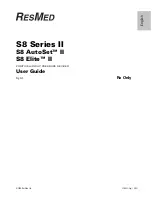
Procedure for Repair Work
Compliance
CAUTION: Modification or changes to this equipment not expressly approved
by manufacturer may void the user”s authority to operate the equipment.
FCC - USA
Proof of purchase is required on all products to initiate repair work under warranty.
We strongly recommend keeping the original receipt. If a proof of purchase is not
available at the time of service, we will estimate the age of unit by the serial
number. Seria number estimates can differ from the actual purchase date. A serial
number estimate is the only method of determining an approximate date of
purchase without a proof of purchase.
series will not be covered. All replacement costs for either the remote or receiver
will be the owner’s responsibility. The warranty is void if the unit has been altered
or an unauthorized person has damaged the unit while attempting repair work.
We reserve the right to retain and discard any parts or accessories that have
been found damaged upon replacement and repair.
If the unit is malfunctioning, please refer to the “Troubleshooting Guide” in the
quick start before sending it back for Service. The cost of shipping products under
warranty back is the customer’s responsibility. We are not responsible for units
damaged or lost in transition. We are not responsible for loss of training time or
inconvenience while the unit is in for repair work. We do not provide loaner units
or any form of compensation during the repair period. A copy of the sales receipt
showing the purchase date may be required before warranty work is initiated.
Please include a brief explanation outlining the problem and include your name,
address, city/state/zip code, daytime phone number, evening phone number, and
email address.
This device complies with part 15 of the FCC Rules. Operation is subject to the
following two conditions:
(1) This device may not cause harmful interference.
(2) This device must accept any interference received, including interference that
may cause undesired operation.
Note:
This equipment has been tested and found to comply with the limits for a
Class B digital device, pursuant to part 15 of the FCC Rules. These limits are
designed to provide reasonable protection against harmful interference in a
residential installation. This equipment generates uses and can radiate radio
frequency energy and, if not installed and used in accordance with the instructions,
may cause harmful interference to radio communications. However, there is no
12
































